Toldois 2016: Emulating the Ways of Our Forefathers and Foremothers!
by devadmin | December 1, 2016 9:30 pm
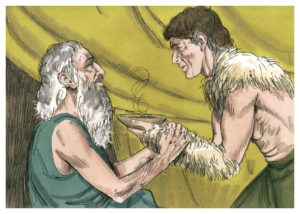 Siman Tov U’mazel tov! We begin this week with a mazel tov shout out to long time friends Naomi and Howie Berg upon the wedding this past Sunday of their beautiful and very accomplished daughter Dana, now Dr. Dana, to Michael Coplin, himself no slouch and soon to be doctor. May they enjoy only marital bliss. Mazel tov to both extended families. Over three decades back, the Oisvorfer introduced Naomi to Howie and shoin!
Siman Tov U’mazel tov! We begin this week with a mazel tov shout out to long time friends Naomi and Howie Berg upon the wedding this past Sunday of their beautiful and very accomplished daughter Dana, now Dr. Dana, to Michael Coplin, himself no slouch and soon to be doctor. May they enjoy only marital bliss. Mazel tov to both extended families. Over three decades back, the Oisvorfer introduced Naomi to Howie and shoin!
Happy birthday wishes to the Oisvorfer’s second son Jonathan, future Hollywood mogul, who will turn 22 tomorrow.
And Mazel tov to the Oisvorfer’s third son Max whose bar mitzvah was marked on parsha Toldois seven years ago this shabbis. May he and his siblings all share in the blessings that Yaakov, in this week’s parsha, somehow got his hands on from his older brother.
Raboyseyee and Ladies:
Emulating the ways of our Forefathers and Foremothers!
Back in the early 70’s, when the future Oisvorfer was still in yeshiva system (too many to mention), the rebbes would often excoriate him to chazer (review) the heylige Gemora over and over -even one hundred times- in order to retain the information he was being taught. It didn’t help! Shoin, here we are in parsha number six of twelve found in Sefer Bereishis. In other words: we have reached midway. It’s efsher time for a shtikel review of the high and low lights of previous parshas. Let’s quickly review our glorious history.
It all began when the RBSO decided to create an entire world (perhaps not His first) in six days. Everything was going well. In fact, after days two and five, He was overly pleased with His creations and so stated. On day six He created Man. According to many, He also created Woman who was seemingly attached to Man. Exactly how that worked out is not clear. Ober once separated, they came face to face and shoin the world was never the same. Odom, having tried mating with different animals and beasts, was excited to view Chava, she was a keeper. Things quickly began spiraling out of control mamish, once the snake walked up -yes, he had legs back then- and began conversing with Chava (Eve). We needn’t review the details other than to recall that the scheming snake caused irreparable damage to Man, Woman and himself, ad hayoim hazeh (until today). A number of medroshim told us that in addition to seducing her into eating of the forbidden, the snake also had eyes, maybe just one, for Chava. He wanted her, sexually. One medrish told us that he was successful; he seeded her. It gets better: she gave birth to various life forms, none human. Shreklich mamish (OMG!).
 Another medrish, grada on this week’s parsha of Toldois, will tell us that Rivka, the 2nd of our Matriarchs, Yitzchok’s wife, about whom we shall be speaking below, was a gilgul (reincarnation) of Chava. And if all that weren’t enough and avada it should have been, the opening parsha also featured Kayin and Hevel, two brothers who could not see eye to eye. Kayin killed Hevel. Too much nachas Odom did not enjoy from Kayin. And for good measure, we also met Lemach, he most famous for having two wives and Rashi told us that in his (Lemach’s) generation, such was the custom: one wife was for child bearing, the other more of sex toy who was expected to maintain her lovely figure.
Another medrish, grada on this week’s parsha of Toldois, will tell us that Rivka, the 2nd of our Matriarchs, Yitzchok’s wife, about whom we shall be speaking below, was a gilgul (reincarnation) of Chava. And if all that weren’t enough and avada it should have been, the opening parsha also featured Kayin and Hevel, two brothers who could not see eye to eye. Kayin killed Hevel. Too much nachas Odom did not enjoy from Kayin. And for good measure, we also met Lemach, he most famous for having two wives and Rashi told us that in his (Lemach’s) generation, such was the custom: one wife was for child bearing, the other more of sex toy who was expected to maintain her lovely figure.
Interestingly, Rivka’s looks are mentioned twice in the heylige Toirah. So are the looks of Soro, Rochel and Leah. Last week we learned that she was ‘very very good looking,’ ober this week, she will be described as only good looking. And if you think even for a moment that a few rabbis didn’t chap the disparity, you would be wrong. Avada they wanted to know how and why she went from very good looking to but plain old good looking. How taka? Nu, asks and and answers the Chizkuni azoy: it’s taka emes that when Eliezer first met Rivka, jug laden, at the well, the heylige Toirah (Bereishis 24:16) referred to her as very very pretty.
| 16 Now the maiden was of very comely appearance, a virgin, and no man had been intimate with her, and she went down to the fountain, and she filled her pitcher and went up. | טזוְהַנַּעֲרָה (כתיב והנער) טֹבַת מַרְאֶה מְאֹד בְּתוּלָה וְאִישׁ לֹא יְדָעָהּ וַתֵּרֶד הָעַיְנָה וַתְּמַלֵּא כַדָּהּ וַתָּעַל: |
Ober later in our parsha, when Yitzchok decided to take a page out of his father’s playbook on ‘how to accumulate instant wealth by having your wife taken to the King’s palace,’ the words used to describe her looks are plain ‘good looking.’
| 7 And the men of the place asked about his wife, and he said, “She is my sister,” because he was afraid to say, “[She is] my wife,” [because he said,] “Lest the men of the place kill me because of Rebecca, for she is of comely appearance.” | זוַיִּשְׁאֲלוּ אַנְשֵׁי הַמָּקוֹם לְאִשְׁתּוֹ וַיֹּאמֶר אֲחֹתִי הִוא כִּי יָרֵא לֵאמֹר אִשְׁתִּי פֶּן יַהַרְגֻנִי אַנְשֵׁי הַמָּקוֹם עַל רִבְקָה כִּי טוֹבַת מַרְאֶה הִוא: |
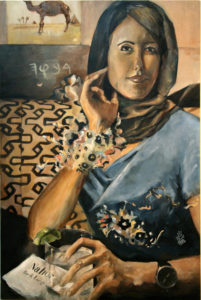 And the question is azoy: what the hec happened to her very good looks? Was she travel weary? Ober answers the Ciizkuni his own question azoy: It’s quite poshit: Rivka was described as very very pretty before she became pregnant with twin boys. Her body was shapely; let’s also recall the jugs. Ober after experiencing a difficult pregnancy and delivering twin boys, her body was not fully recovered and she was seemingly not as good looking as earlier. Lesson learned: her looks were downgraded. She was described as very very good looking before she gave birth, ober, after a difficult pregnancy and having given birth to twins, her body did not efsher return to its youthful appearance. Nu, is medrish gishmak or what? Veyter.
And the question is azoy: what the hec happened to her very good looks? Was she travel weary? Ober answers the Ciizkuni his own question azoy: It’s quite poshit: Rivka was described as very very pretty before she became pregnant with twin boys. Her body was shapely; let’s also recall the jugs. Ober after experiencing a difficult pregnancy and delivering twin boys, her body was not fully recovered and she was seemingly not as good looking as earlier. Lesson learned: her looks were downgraded. She was described as very very good looking before she gave birth, ober, after a difficult pregnancy and having given birth to twins, her body did not efsher return to its youthful appearance. Nu, is medrish gishmak or what? Veyter.
Ten Generations but one shabbis later, the RBSO had seen enough. His creations had gone rogue and He decided to hit the factory reset button. All were doomed but the Noiach family. We met and got to know Noiach, his eishes chayil and their three boys. Following the one year boat ride, Noiach planted a vineyard, took to the juice, became inebriated and according to one or more medroshim, one of his own boys, Chom, along with a grandson by the name of K’nan, also got to know him, if you chap. Depending on which medrish talks to you, he was either raped, castrated, sodomized. Ouch! Surprisingly, neither of them opened a yeshiva. Nachas? Shoin, having children is like owning a stock portfolio; they don’t all perform well at the same time. Noiach, a goy, did have some yiddishe nachas: one of his boys, Sheym, opened a very famous -ad hayoim hazeh- yeshiva whose students included Yitzchok, Yaakov, Rivka and mistama others. Or, did he?
A week later in Lech Lecho, we met Avrohom and Soro. Soro was nebech barren. Avrohom also married Hogor, Soro’s maidservant and Yishmoel was born. Soro regretted having to share her husband with Hogor and kicked her out. A good step-mother to Yishmoel she was not. As an OHEL foster parent, she mistama did not qualify. Also in Lech Lecho, Avrohom suggested that Soro lie and tell the good people of Mitzrayim that she was his sister. That fib earned her a free trip to the King’s palace where he was planning to introduce Soro to his scepter, if you chap. The RBSO intervened: Soro was reunited with her husband. Avrohom was the recipient of parting gifts. He took note of this model and would employ it again one parsha later. He was smart. At 99 Avrohom underwent circumcision as did all the males in his household. Ouch!
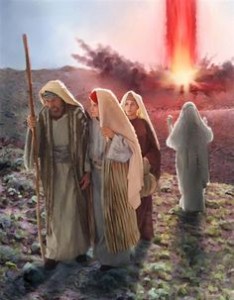 Having seen enough of the ongoing shenanigans, sexual and otherwise, in parsha Vayero, the RBSO decided to permanently do away with the cities of Sedoim and surrounds. He shared His plans with Avrohom who, in an exercise of futility, tried valiantly negotiating for its inhabitants to be saved. Ober a great negotiator he was not, as was confirmed but one parsha later in Chaya Soro. Crafty for sure, ober negotiations 101 he mistama did not study. Perhaps this course was only offered at the Sheym & Eyver yeshiva; we shall find out. We also met the famous Loit family. He and his two lovely daughters were saved ober soon thereafter, the girls found some wine in their hideout cave and got quite creative. They plied their father Loit with wine and both daughters, on two consecutive nights, came upon him, mamish. They raped their own father, say it’s not so. Both became pregnant and gave birth. Because generations later, no lesser a giant than Dovid Hamelech and eventually the Moshiach himself will both trace their genealogies back to this cave. The girls were given a pass for their act of fornication mamish, and Loit, the nebech innocent victim, will be labeled as the pervert and overall bad guy. Why?
Having seen enough of the ongoing shenanigans, sexual and otherwise, in parsha Vayero, the RBSO decided to permanently do away with the cities of Sedoim and surrounds. He shared His plans with Avrohom who, in an exercise of futility, tried valiantly negotiating for its inhabitants to be saved. Ober a great negotiator he was not, as was confirmed but one parsha later in Chaya Soro. Crafty for sure, ober negotiations 101 he mistama did not study. Perhaps this course was only offered at the Sheym & Eyver yeshiva; we shall find out. We also met the famous Loit family. He and his two lovely daughters were saved ober soon thereafter, the girls found some wine in their hideout cave and got quite creative. They plied their father Loit with wine and both daughters, on two consecutive nights, came upon him, mamish. They raped their own father, say it’s not so. Both became pregnant and gave birth. Because generations later, no lesser a giant than Dovid Hamelech and eventually the Moshiach himself will both trace their genealogies back to this cave. The girls were given a pass for their act of fornication mamish, and Loit, the nebech innocent victim, will be labeled as the pervert and overall bad guy. Why?
Ver veyst; the medrish will proffer a few reasons. Avrohom is now 99 and Soro ten years younger. A Malach Hashem will predict that Soro will give birth one year hence. When one is visited by a Malach Hashem, one needn’t worry about the veracity of his predictions. A suddenly young again Soro (her menstrual cycle having magically returned) is pregnant. Avrohom and Soro became parents to Yitzchok. He is 100, she 90. 37 years later, the RBSO again testing Avrohom’s faith (for a 10th time according to most), instructed him to sacrifice his favorite son Yitzchok on the Akeydo. Astonishingly, Yitzchok went along with the plan. At the last moment, another Malach Hashem (Angel) called out to cancel the event. Avrohom passed, Yitzchok was spared. Avrohom descended the mountain and headed home. Yitzchok? He either came down the mountain with his father, died and went to heaven (only to be resurrected), or took off to the famous yeshiva being run by Sheym & Eyver.
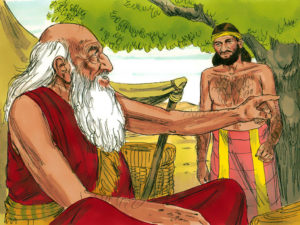 Last week in parshas Chaya Soro, following her passing -some say her soul mamish flew away from the shock of hearing that Avrohom took her only son Yitzchok off to be slaughtered without consulting her -and who can blame him- we found Avrohom negotiating to pay full price for a suitable burial place offered to him free of charge. While real estate negotiations were not his strength, he had plenty of money. Let’s recall that he made a small fortune, twice, by concocting a plan to rid himself of his wife by having another king believe that Soro was his sister. Seemingly she was still quite attractive. Later in the parsha, Eliezer was commissioned to find a suitable mate for Yitzchok who was still single and just about 40. Perhaps not completely satisfied that Eliezer wouldn’t try chapping Yitzchok’s bashert for himself, or, for his own son Avrohom perfected the mission statement by having Eliezer swear. He did this by holding onto Avrohom’s yerech, a euphemism for the male organ. Eliezer found a three year old (according to Rashi and others) Rivka at the well where she was loaded with jugs, if you chap. Impressive at any age; at three mamish amazing. They married.
Last week in parshas Chaya Soro, following her passing -some say her soul mamish flew away from the shock of hearing that Avrohom took her only son Yitzchok off to be slaughtered without consulting her -and who can blame him- we found Avrohom negotiating to pay full price for a suitable burial place offered to him free of charge. While real estate negotiations were not his strength, he had plenty of money. Let’s recall that he made a small fortune, twice, by concocting a plan to rid himself of his wife by having another king believe that Soro was his sister. Seemingly she was still quite attractive. Later in the parsha, Eliezer was commissioned to find a suitable mate for Yitzchok who was still single and just about 40. Perhaps not completely satisfied that Eliezer wouldn’t try chapping Yitzchok’s bashert for himself, or, for his own son Avrohom perfected the mission statement by having Eliezer swear. He did this by holding onto Avrohom’s yerech, a euphemism for the male organ. Eliezer found a three year old (according to Rashi and others) Rivka at the well where she was loaded with jugs, if you chap. Impressive at any age; at three mamish amazing. They married.
Welcome to parsha Toldois. Twenty years have passed since Yitzchok met and married Rivka. She too, like her mother-in-law Soro who was nebech barren for decades, could not conceive. Why the RBSO arranged matters so that three of our four matriarchs were barren while the fourth, Leah, was a baby machine, ver veyst? Who are we to question the ways of the RBSO. Thankfully, He does not question us too often. Ober was she really barren for twenty years? Wasn’t she all of three years young when she married Yitzchok? Do three year olds get their periods? Can they conceive? Nu, maybe by the umois ho’oilom, ver veyst. Thankfully one medrish quoted by Rashi, who else, will tell us azoy: Yitzchok taka chapped or perhaps not, that Rivka was but three and waited approximately ten years until she was of child bearing age. One medrish (Be’er Bosodeh) will tell us that her cycle kicked in in her 12th year. How he knew this specific information, ver veyst? Our parsha then opens after the second set of ten years. Rivka is now 22 or 23 years old. Specifically how old depends on which medrish talks to you. Yitzchok is now 60.
And now, let’s learn this week’s parsha of Toldois, which means generations. After twenty years of marriage without children, Yitzchok and Rivka take to praying. We assume they also tried other more conventional methods of conception. Rashi tells us that only Yitzchok’s prayers were answered, more on that below. Rivka conceived twins. Radak says that Yitzchok prayed intensely so that he would not have to take a second wife as did his father Avrohom. Could be, or is pshat that he was davening farkert? Efsher he wanted a second wife and a few pilagshim (concubines) just like his father? Ver veyst? Nu, that’s something to daven for!
She struggled mightily during pregnancy, was in constant pain. Says Rashi, who avada knew exactly what happened, azoy: she went to see Sheym (Noiach’s eldest son) for answers. We’re taught that Sheym and his grandson, Eyver went into business together running a Yeshiva; it is after all a business, isn’t it? She’s told through prophecy that her suffering is but a microcosmic prelude to the world-wide conflict that will ensue between the two great nations brewing in her belly: Rome and Israel. Mistama not what she expected or wanted to hear and one can imagine that such news didn’t ease her pain much. The boys are born, Eisav first, followed by Yaakov holding onto his brother’s heel.
And while men all over the world, having long left the pristine environment of the uterus are fighting to get back in, if you chap, and will do kimat anything to gain such re-entry, Rashi tells us that both Yaakov and Eisav were fighting to get out! Yaakov wanted to leave when his mother walked by a yeshiva, while Eisav the minuvil in the making, felt the need to exit when Rivka walked in the proximity of an idol and made a dash for the exit. Efsher you’re wondering why Yaakov would want to leave such a warm nurturing environment when another medrish tells us that during gestation and while inside the womb, a malach teaches the fetus the entire heylige Toirah? Isn’t a malach a better Rebbe than any human being? Taka an excellent kasha, answers anyone? Nu, avada there are answers proffered and among the most popular is that he Yaakov was not happy with his chavrusa (study-mate) and wanted out.
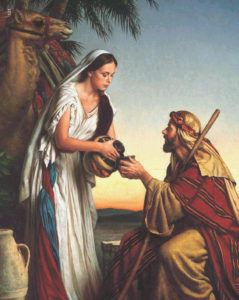 The heylige Toirah tells us that Yitzchok and Rivka davened separately but that only his prayers were accepted. And says the Yalkut Shimoni something mamish shreklich: Yitzchok went looking for but could not find evidence that Rivka was a virgin. Yitzchok did what? Shoin, that’s what the medrish tells us, who are you to question? In any event, when not found, he suspected his trusted servant Eliezer whose mission it was to chap a wife for Yitzchok, the very person who swore to uphold his holy mission by upholding Avrohom’s organ, of foul play. He mamish suspected Eliezer of chapping Rivka, his (either) three or fourteen year old bride to be. What evidence a three year old was supposed to have, ver veyst? Ober, if emes, that would explain why Yitzchok and Rivka davened separately and in different corners of the room: they weren’t on speaking terms!
The heylige Toirah tells us that Yitzchok and Rivka davened separately but that only his prayers were accepted. And says the Yalkut Shimoni something mamish shreklich: Yitzchok went looking for but could not find evidence that Rivka was a virgin. Yitzchok did what? Shoin, that’s what the medrish tells us, who are you to question? In any event, when not found, he suspected his trusted servant Eliezer whose mission it was to chap a wife for Yitzchok, the very person who swore to uphold his holy mission by upholding Avrohom’s organ, of foul play. He mamish suspected Eliezer of chapping Rivka, his (either) three or fourteen year old bride to be. What evidence a three year old was supposed to have, ver veyst? Ober, if emes, that would explain why Yitzchok and Rivka davened separately and in different corners of the room: they weren’t on speaking terms!
Ober before we accuse Rivka falsely of such behavior at 3 or 14 year old, efsher we can explain pshat azoy: Rivka was completely innocent of the charges as any 3 or 14 year old and that the reason that her prayers were not answered is because there was no need for prayer on her part. She was pure and innocent as any 3 or 14 year old should be and because Yitzchok had suspected her of foul play, she was already guaranteed by the RBSO through laws of the Soita (later in Bamidbar) that she would be rewarded and give birth; gishmak mamish! As an aside, a Soitah is a married woman accused by her husband of infidelity. Avada all this took place hundreds and hundreds of years before the Toirah and the Soita laws were given but hey, didn’t we learn that the heylige Ovois kept the entire Toirah anyway? Of course we did. Shoin! Yitzchok suspected his 3 year old kallah of being chapped by Eliezer. She was innocent mamish and according to the Toirah, one who is suspected falsely, is guaranteed to have children. And according to this thinking, Yitzchok needed to daven for children and his prayers were answered. Unfortunately this doesn’t answer why she had pain during her pregnancy since the lack of pain is also one of the rewards promised to those innocent of chapping charges, ober who says we have to have answers for everything in one parsha? Veyter!
Efsher you’re wondering why Rivka, feeling pain and angst during her pregnancy, went to a Yeshiva instead of scheduling a visit with her obstetrician, are you? Says the Medrish: Rivka Emainu went to the bais ha’medrish of Sheym’s yeshiva because Sheym was a Novee (prophet) and she figured that he would have givaldige insight into what was going on in her uterus. Ober there’s more to this story. Seemingly, Sheym was a great man, a spiritual giant who headed a yeshiva which catered to the people of that era who were actively seeking the word of the RBSO. Among the distinguished alumni of his yeshiva was none other than Yitzchok Oveenu. He was? Says Targum Yoinoson azoy: following the Akeydo, the malochim (heavenly angels) whisked him away from the danger zone and enrolled him into Sheym’s Yeshiva, (efsher for safekeeping), where he dormed for shonos aleph, beis, gimmel, efsher a forerunner of the post high school yeshiva model of today where they try hoodwinking the kids into believing that they need this extra time to work on themselves. Ha! Most kids are working on themselves since high school, if you chap.
And after seeing how well rounded and educated her husband was, she went to the same yeshiva to get answers about her pregnancy. Avada we all know from another Medrish that following Sheym’s leadership, he passed the family business over to his grandson Eyver who continued to grow the yeshiva. Next week we’ll taka learn that Yaakov Oveenu also enrolled in the very same Yeshiva. At the age of sixty-three, after leaving home with Eisav in pursuit, Yaakov went to Ever’s yeshiva and spent fourteen years there studying various topics including trading soup for birthright, fooling his elderly father into giving him blessings intended for his older brother Eisav, and a few other tricks he taka needed to escape his shver Lovon’s house. Ober chap nisht: that all goes down next week. What taka happened to that yeshiva, ver veyst. Seemingly all was going well until some rebbe was epes a shtikel too friendly with one or more bochurim (students), and began inappropriate chapping. Soon thereafter, the myseh became bavust (well known), the rebbe, after exposing himself, was now exposed and the yeshiva, after massive judgments were levied against it, was shut down. Sadly, it took a few thousand years for this medrish to eventually be emes. Nu, as many a famous rabbi has said over and again: every medrish is emes, some just didn’t happen yet. Veyter.
Efsher you’re wondering why good people have trouble having children when the average shiksa and tinkele, get pregnant even when they use protection. Why does the RBSO make these good people suffer? Why were ¾ of our Emohois (foremothers) barren for many years? We already learned that Soro was childless till age 90 and in a week or so we’ll learn that mama Rochel didn’t nebech conceive until her older sister had a bunch. Nu, you’re not alone. In the cases of Soro and Rochel, the husbands were not the issue; seemingly, they were chapping and seeding plenty. Ober says the heylige Gemora that the RBSO desires the prayers of the righteous. He’s even happy when oisvorfs like you mumble a few words of prayer in Shul during talking. Even though rational analysis suggests that the Emohois, mistama, more so than anyone else, deserved to have kinderlach, nevertheless, the RBSO showed that it had nothing to do with rational judgment and expectations. He’s in charge of di ganze velt (the entire world) and has a master plan.
And efsher you’re wondering why the RBSO willed it so that both Yaakov and Eisav would be born together and why Rivka needed to endure such giferliche pains during her pregnancy. Nu, Chazal (our wise ones) teach us that the sword and the book came down from heaven bound together. Yaakov avada represents the book and Eisav the sword. Therefore, they came down entwined together to teach you that it is impossible to have one without the other – the book needs the sword, because if not for the sword the book would not be kept.
Back to the twins: They grow up. Some say this means they became bar mitzvah (givaldige speech material) and by this time their personality traits are quite apparent. Eisav is a hunter, a man of the field. Yaakov opts for the good and stress-free life in Yeshiva, a model since emulated in Lakewood and other fine institutions where work is considered stressful and is strictly verboten. We’re taught Eisav was the bad guy. Why was one good and one bad? Is hunting so giferlich? Most of you chazerrim have been hunting and playing the field since your teens and loi olaynu haven’t stopped. And why was the bad one older so that the younger one had to shvindel (outwit) him in order to get what was necessary for him to fulfill the RBSO’s plan? Why couldn’t Yaakov be born first and get the firstborn rights from the get-go? Ver veyst? Raboyseyee, as the Oisvorfer has told you many times: the RBSO has a master plan; we’re just puppets in the big theater. Who says we have to understand everything? You’ve got to believe; that’s all. Nu, back to the parsha.
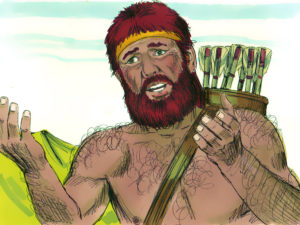 The boys are now 15. Avrohom, their Zeidy dies. It’s the day of the levaya (funeral) and the story gets interesting. Yaakov is home cooking lentil soup, the traditional mourner’s meal. How traditional could it have been and who started this tradition, ver veyst? Next: Eisav, just back from hunting, is having a hard day, if you chap. He’s ravenous. What’s pshat? Why was he taka so hungry? Nu, let’s find out.
The boys are now 15. Avrohom, their Zeidy dies. It’s the day of the levaya (funeral) and the story gets interesting. Yaakov is home cooking lentil soup, the traditional mourner’s meal. How traditional could it have been and who started this tradition, ver veyst? Next: Eisav, just back from hunting, is having a hard day, if you chap. He’s ravenous. What’s pshat? Why was he taka so hungry? Nu, let’s find out.
Says the heylige Gemora (Buba Basra 16b) azoy: On this day, the day Avrohom Oveenu passed away, this wicked man transgressed five sins. He raped a betrothed woman, he murdered someone, he denied the RBSO’s existence, he denied the resurrection, and he belittled the bechoira (birthright). Zicher, es lust zich redden (surely it stands to reason) why he’s ravenous on this day; he’s put in a full day’s work. Bedding a married woman, raping and killing can sap one’s energy. In fact, the medrish tells us that the main reason for his extreme exhaustion was as a result of cohabiting with that married woman. Seemingly, such extra martial activity can mamish sap one’s strength and also make one hungry and efsher good enough reasons to abstain? Ver veyst. Bottom line: according to most, Eisav is a bad guy!
Is that so? Avada not all agree that he was so giferlich. Says The Riva: it was common for hunters to wander around the forest in search of prey for as much as four days at a time. As a result, they would often arrive home in a state of total exhaustion, literally dying of hunger and thirst. In other words: he was just hungry, is that a crime? According to others, however, Eisav arrived home after having killed Nimrod for his special hunting-clothes. Nimrod’s men were chasing after Eisav in their efforts to avenge their master’s death. He had managed to shake them, but it had left him utterly spent. Maybe he was just a murderer and not a rapist; is that so giferlich?
Ober, before we write him off completely, listen to another medrish which tells us that Eisav had excellent midos (character traits). He is considered the paradigm of virtuous behavior towards a parent – kibud Av Ve’Aim (honoring parents), efsher among the greatest of all 613 mitzvis. Moreover, the heylige Toirah tells us that his dad, Yitzchok mamish loved him and that Eisav loved him back. He gave his father kuvid (respect) and served him faithfully. Says the Zoihar, and who knew better, that the power of Eisav’s kibud Av, was greater than that of his brother Yaakov. Says the Medrish: Reb Shimon ben Gamliel commented, “All my life I served my father, but I did not attain even one percent of the service performed by Eisav for his father. I was not particular about the cleanliness of my clothes when servicing my father. Only when I went out into the public eye did I take note of the condition of the clothes I was wearing. In contrast, Eisav was particular to serve his father in clean garments, but would not care if he walked into the market wearing rags.” Efsher that would explain why Yitzchok, later in the parsha, asked his favorite son to “go out to the field and hunt game for me, then make me delicacies such as I love, and I will eat, so that my soul may bless you before I die” (B’reishis 27:3-4). Ober chap nisht (patience please), that comes up later. Moreover, another medrish tells us that in reality, Eisav was supposed to be one of the Ovois (forefathers). Just as we had four Emohois (foremothers), so too, we should have had four Ovois; Avrohom, Yitzchok, Eisav, and Yaakov. Gevald!!
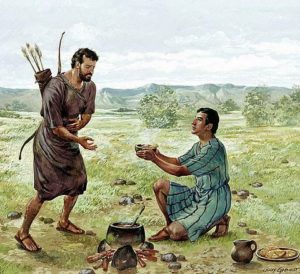 Next: Eisav begs his only brother for some lentil soup that Yaakov is cooking. One would think that the yeshiva bochur would gladly feed his twin brother but the heylige Toirah tells us that Yaakov wasn’t in a giving mood, no freebies. Yaakov was a skilled negotiator and proposed a deal. Said Eisav: “Please, stuff me now with this red, red stuff, because I’m really tired.“ He was shvach (weak), and about to pass out. All he wanted was to open his mouth and for the soup to be poured down his throat. One would think that a brother would do anything, even mouth to mouth, ober not Yaakov. Said he: “If you want hot liquid, sell me your birthright today.” Yaakov doesn’t need liquid soup, he wanted liquidity. He wanted the primogeniture and all that came with it! Said Eisav, “I’m going to die; what do I need this birthright for?” Said Yaakov: “Swear to me today.” They made the deal and since that day, and ad hayoim hazeh (till today), Eisav hates his brother and the rest of us Yiddin. All this hate for a bowl of soup? Yikes! Nu, can we really blame him?
Next: Eisav begs his only brother for some lentil soup that Yaakov is cooking. One would think that the yeshiva bochur would gladly feed his twin brother but the heylige Toirah tells us that Yaakov wasn’t in a giving mood, no freebies. Yaakov was a skilled negotiator and proposed a deal. Said Eisav: “Please, stuff me now with this red, red stuff, because I’m really tired.“ He was shvach (weak), and about to pass out. All he wanted was to open his mouth and for the soup to be poured down his throat. One would think that a brother would do anything, even mouth to mouth, ober not Yaakov. Said he: “If you want hot liquid, sell me your birthright today.” Yaakov doesn’t need liquid soup, he wanted liquidity. He wanted the primogeniture and all that came with it! Said Eisav, “I’m going to die; what do I need this birthright for?” Said Yaakov: “Swear to me today.” They made the deal and since that day, and ad hayoim hazeh (till today), Eisav hates his brother and the rest of us Yiddin. All this hate for a bowl of soup? Yikes! Nu, can we really blame him?
And what can we learn from the different personalities we have encountered in these first six parshas? Many were quite colorful. A few went on to become our forefathers and foremothers.
A gittin Shabbis
The Oisvorfer
Yitz Grossman
Source URL: https://oisvorfer.com/toldois-2016-emulating-the-ways-of-our-forefathers-and-foremothers/